Congo Ebola outbreak is 2nd largest, 2nd deadliest

A 2000-01 outbreak in Uganda included 425 cases and caused 224 deaths, according to the World Health Organization. The deadliest outbreak occurred in West Africa in 2014, when the disease killed more than 11,000 people. "This is a milestone nobody wanted to hit," WHO spokesman Tarik Jasarevic wrote in an email. On average, Ebola — which causes fever, severe headache and in some cases hemorrhaging — kills about half of those infected, but case fatality rates in individual outbreaks have varied. The latest outbreak in Congo, which began in August, has a case fatality rate of 57%. Of the total cases, 379 have been confirmed, and 47 are probable, according to the ministry. An additional 87 suspected cases are under investigation.On a positive note, 126 patients have recovered, the ministry said. This is the 10th outbreak since 1976 in Congo, where the virus is endemic, and the second this year.North Kivu province, which includes the cities Beni, Kalunguta and Mabalako, remains the epicenter of the outbreak, though cases have been reported inneighboring Ituri province, according to WHO. The two provinces are among the most populated in the nation and border Uganda, Rwanda and South Sudan. 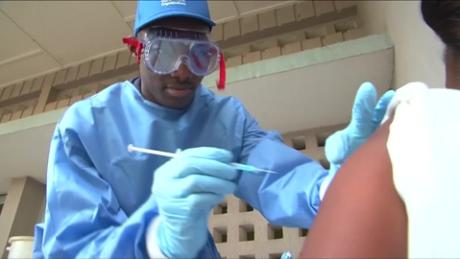 "The risk of the outbreak spreading to other provinces in the Democratic Republic of the Congo, as well as to neighbouring countries, remains very high," WHO said in a statement Thursday. However, there have been no confirmed cases in Congo's neighbors, Jasarevic said. "All neighboring countries have implemented heightened surveillance and are detecting and investigating alerts and suspected Ebola cases."
"The risk of the outbreak spreading to other provinces in the Democratic Republic of the Congo, as well as to neighbouring countries, remains very high," WHO said in a statement Thursday. However, there have been no confirmed cases in Congo's neighbors, Jasarevic said. "All neighboring countries have implemented heightened surveillance and are detecting and investigating alerts and suspected Ebola cases."
Cases continue to mushroom
Recent spread of the infection to people in Butembo, a city that's home to 1.2 million, "raised concerns," wrote Lawrence O. Gostin, a professor and faculty director of the O'Neill Institute for National and Global Health Law at Georgetown Law, and his co-authors in an editorial published online Thursday in the medical journal JAMA. Seeing "gaps in the response," Gostin and his co-authors recommend that the United States and allies "mobilize high-level political attention and resources for the Ebola response" and "develop a plan to deploy public health personnel to North Kivu."In October, US Centers for Disease Control and Prevention personnel who had been stationed in Congo had been pulled back from the worst affected areas due to safety concerns, a US government official familiar with the situation said at the time. Not only is North Kivu experiencing spread of deadly Ebola, but long-term conflict smolders there, with 50 armed groups causing intermittent violence, according to WHO. 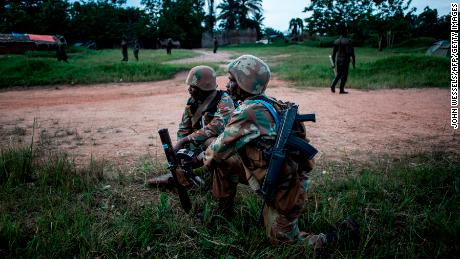 A senior White House official confirmed this month that US government personnel who had been working on the ground in Beni had been evacuated to other parts of Congo due to safety concerns. The official said that the situation is being evaluated constantly and that in the meantime, the US continues to provide technical and financial assistance to contain the outbreak.Jasarevic described the overall environment as "complex and challenging.""On Friday, 16 November, a second attack in one week occurred in Beni," he reported. "UN peacekeepers and government forces engaged with rebel forces. By Sunday, November 18 all activities in Beni were re-launched, including vaccination." Jasarevic says the response in areas outside Beni has not been affected by conflict, but WHO estimates that more than a million refugees and internally displaced people are traveling through and out of North Kivu and Ituri, and this movement is a potential risk factor for the spread of Ebola.
A senior White House official confirmed this month that US government personnel who had been working on the ground in Beni had been evacuated to other parts of Congo due to safety concerns. The official said that the situation is being evaluated constantly and that in the meantime, the US continues to provide technical and financial assistance to contain the outbreak.Jasarevic described the overall environment as "complex and challenging.""On Friday, 16 November, a second attack in one week occurred in Beni," he reported. "UN peacekeepers and government forces engaged with rebel forces. By Sunday, November 18 all activities in Beni were re-launched, including vaccination." Jasarevic says the response in areas outside Beni has not been affected by conflict, but WHO estimates that more than a million refugees and internally displaced people are traveling through and out of North Kivu and Ituri, and this movement is a potential risk factor for the spread of Ebola. 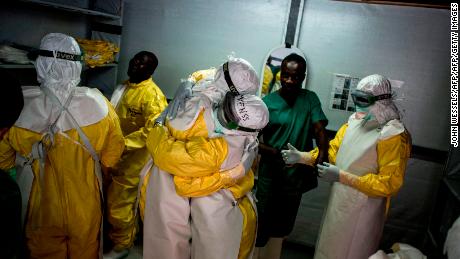 Despite such risks and safety concerns, Congo's response effort has been robust. The Ministry of Health has 900 people active in the response, according to Jasarevic, and of these, 85% are from the local area. Additionally, WHO has deployed 300 of its own staff to the region. The latest minstry report indicates that 37,559 people have received an experimental vaccine in a campaign that began August 8. "This includes over 11,100 health and frontline workers, and 9,300 children," Jasarevic said.The experimental rVSV-ZEBOV vaccine, made by pharmaceutical company Merck, proved highly protective against the deadly virus in a major trial in Guinea, according to WHO. Gostin and his co-authors are doubtful. "Despite deploying an experimental vaccine, cases doubled in October 2018," they wrote. More generally, they believe that the overall response, which also includes contact tracing and investigational treatments, may not be adequate.
Despite such risks and safety concerns, Congo's response effort has been robust. The Ministry of Health has 900 people active in the response, according to Jasarevic, and of these, 85% are from the local area. Additionally, WHO has deployed 300 of its own staff to the region. The latest minstry report indicates that 37,559 people have received an experimental vaccine in a campaign that began August 8. "This includes over 11,100 health and frontline workers, and 9,300 children," Jasarevic said.The experimental rVSV-ZEBOV vaccine, made by pharmaceutical company Merck, proved highly protective against the deadly virus in a major trial in Guinea, according to WHO. Gostin and his co-authors are doubtful. "Despite deploying an experimental vaccine, cases doubled in October 2018," they wrote. More generally, they believe that the overall response, which also includes contact tracing and investigational treatments, may not be adequate.
'Cascading transmission' of the disease
"Of 137 confirmed cases between October 28 and November 26, only 19 were found through contact tracing, 32 were on contact lists but lost to follow-up, and 83 (61%) had no known links to confirmed cases," Gostin and his co-authors wrote. "These data suggest contact tracing and vaccination have not prevented cascading transmission." Gostin also believes that "community distrust is deep after decades-long humanitarian crises, impeding information-sharing and cooperation." They note that WHO and UN pledged enhanced security operations this month, "yet lethal attacks have persisted."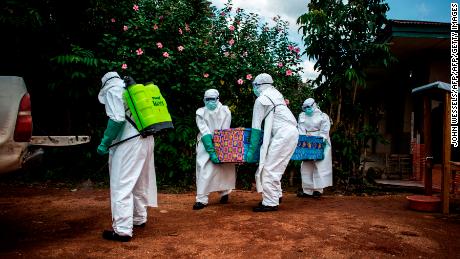 Nora Love, field director for the International Rescue Committee's operations in the region, offers a more nuanced view.From mid-September through the end of last week, the nonprofit humanitarian group has trained over 730 health care workers who staff the dozens of health care facilities between the group's two field offices in Beni and Butembo."It's a very lush green area that rains every day, and the temperatures are pretty nice, but it's definitely a city at the edge of a country, and you can see that it also has been under conflict. There's definitely a tension within the communities here," Love said. "You know that you're in a conflict area. There's always some sort of insecurity happening every single day." Despite this, she does not feel "unwelcome here from the community," she said, and she does not feel under threat because she works within health facilities, "which are a little bit more isolated than going to a village."
Nora Love, field director for the International Rescue Committee's operations in the region, offers a more nuanced view.From mid-September through the end of last week, the nonprofit humanitarian group has trained over 730 health care workers who staff the dozens of health care facilities between the group's two field offices in Beni and Butembo."It's a very lush green area that rains every day, and the temperatures are pretty nice, but it's definitely a city at the edge of a country, and you can see that it also has been under conflict. There's definitely a tension within the communities here," Love said. "You know that you're in a conflict area. There's always some sort of insecurity happening every single day." Despite this, she does not feel "unwelcome here from the community," she said, and she does not feel under threat because she works within health facilities, "which are a little bit more isolated than going to a village."
Getting ahead of an infectious disease
"The people who are doing the safe burials have been the most exposed and the most vulnerable because people are very emotional after they lost a loved one," Love said. "And the protocols for safe burial are different than the traditional burials here, and that causes some distress within the community." Traditional burials involve touching the body of the deceased. To prevent spread of the infectious disease, safe burials require protective equipment and sanitizing the family's environment.Still, Love has witnessed "violent reactions" at hospitals and health facilities when deaths occur. Patients have been forcefully removed from the hospital by their loved ones, she said. "Last week, they went to a hospital when somebody died, and they did vandalism and burned some things," Love said. "Luckily, so far, no health workers have been harmed by this, but there's always a watching and being aware that it could flare up."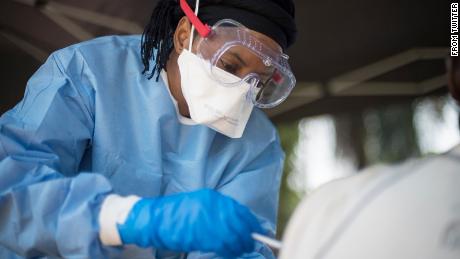 Violence is not the only challenge, as Beni has recently experienced a "significant increase" in the number of malaria cases, according to a recent report from the Ministry of Health. Love's main frustration has been the difficulty of getting "ahead of things. Just when we feel we've made strides in one location, then the outbreak has moved somewhere else," she said. As a result, her organization has been exploring new strategies to see whether it can become more flexible and more rapid in its response.Meanwhile, the larger response persists. Health care workers continue with vaccination efforts as WHO along with Congo conducts its first randomized control trial to evaluate the effectiveness and safety of the experimental drugs offered under "compassionate use" to treat Ebola patients.WHO said it remains "focused on the ongoing containment efforts to end the outbreak" and recommends that neighboring provinces and countries "enhance surveillance and preparedness activities." "We want to make sure that the international community does have its eyes on it and not just the UN," Love said.Jasarevic remains hopeful: "We are confident that working together with all our partners, we can and will end it."
Violence is not the only challenge, as Beni has recently experienced a "significant increase" in the number of malaria cases, according to a recent report from the Ministry of Health. Love's main frustration has been the difficulty of getting "ahead of things. Just when we feel we've made strides in one location, then the outbreak has moved somewhere else," she said. As a result, her organization has been exploring new strategies to see whether it can become more flexible and more rapid in its response.Meanwhile, the larger response persists. Health care workers continue with vaccination efforts as WHO along with Congo conducts its first randomized control trial to evaluate the effectiveness and safety of the experimental drugs offered under "compassionate use" to treat Ebola patients.WHO said it remains "focused on the ongoing containment efforts to end the outbreak" and recommends that neighboring provinces and countries "enhance surveillance and preparedness activities." "We want to make sure that the international community does have its eyes on it and not just the UN," Love said.Jasarevic remains hopeful: "We are confident that working together with all our partners, we can and will end it."
Original Article
[contf] [contfnew] 
CNN
[contfnewc] [contfnewc]



